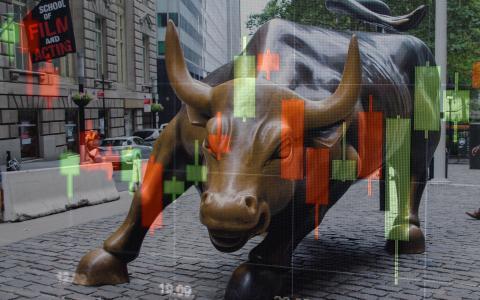
Equities are poised for a further 10% increase, and this upward trend in the market does not hinge on reductions in Federal Reserve rates, as posited by Jeremy Siegel, a notable professor at Wharton.
Siegel maintains a bullish stance on the market's prospects, despite impressive returns in 2023 and less-than-expected performances from major technology companies, including Tesla and Intel, in this earnings season. Presently, 69% of S&P 500 companies that have reported their earnings have surpassed expectations, a figure that, although commendable, falls short of previous years' benchmarks, as reported by FactSet.
Nevertheless, Siegel forecasts a potential 10% rally in stocks for 2024, as shared in a CNBC interview. This prediction stems from the current reasonable valuations of stocks, which, despite not being low-priced, still offer potential for growth. For instance, growth stocks trading at twenty times their earnings still have upward potential, according to Siegel.
Supporting these fair valuations is a robust U.S. economy. The Commerce Department's data shows a 3.3% increase in real GDP on a year-over-year basis for the last quarter, indicating sustained growth despite tighter financial conditions.
These factors contribute to the increasing likelihood of the U.S. averting a recession this year, with the probability of a gentle economic deceleration becoming more plausible each day, Siegel remarks.
Siegel anticipates an 8%-10% annual gain, buoyed by a strong economy. He believes that the S&P 500 earnings will surpass the projected $242, thereby driving further stock market advances.
The S&P 500 index entered a bull market last year, ascending over 20% from its October 2022 nadir. This rally culminated in a new peak at the end of the last week, marking a series of record-high closings in January.
These gains are largely driven by the anticipation of Federal Reserve rate cuts within the year, anticipated to ease financial conditions and elevate asset values. Market investors, referencing the CME FedWatch tool, expect approximately six rate cuts by the end of 2024, a figure notably higher than what central bankers have forecasted for the year.
However, Siegel argues that the bull market's sustainability does not solely depend on the Federal Reserve's rate cuts. Even if the Fed does not aggressively lower interest rates, the market can still experience growth.
Siegel asserts that a robust economy with solid earnings is preferable to rapid rate cuts by the Fed in response to recession fears. He emphasizes that a true bull market does not necessarily rely on swift rate reductions.
Wall Street strategists, including those from Goldman Sachs, Deutsche Bank, and BMO, also predict a positive outlook for stocks this year, with projections of an 8%-10% increase in the S&P 500. Foremost analysts like Ed Yardeni even anticipate gains as high as 17% in the benchmark index.



